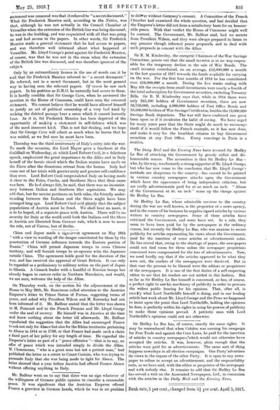Sir Hedley Le Baa, whose admirable services to the country
during the war are well known, is the proprietor of a news agency, and in the course of his business he supplied signed articles by various writers to country newspapers. Some of these articles have criticized the Government, and sonic have not As a rule, they seem to have been paid for by the newspapers in the ordinary course, but recently Sir Hedley Le Bag, who was anxious to secure publicity for articles representing his views about the Government, paid for the insertion of some articles at advertisement rates. He has stated that, owing to the shortage of paper, the newspapers could not find room for them unless the newspaper proprietors concerned were compensated for the loss of advertisements. Now, we need hardly say that if the articles appeared to be what they were not, the readers of the newspapers were deceived. But in that case the persons to be blamed were the editors or proprietors of the newspapers. It is one of the first duties of a self-respecting editor to see that his readers are not misled in this fashion. But so far as Sir Hedley Le Bas himself is concerned, ne has, of course, a perfect right to use his machinery of publicity in order to procure the widest public hearing for his opinions. That, after all, is exactly what Lord Northcliffe himself is doing, and in our leading article last week about Mr. Lloyd George and the Press we happened to insist upon the point that Lord Northcliffe, holding the opinions he does, is perfectly within his rights in using his powers of publicity to make those opinions prevail. A patriotic man with Lord Northcliffe's opinions could not act otherwise.


























 Previous page
Previous page